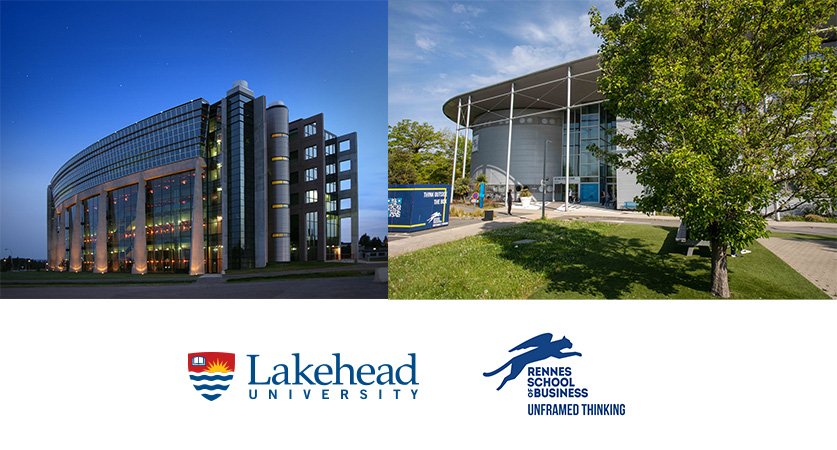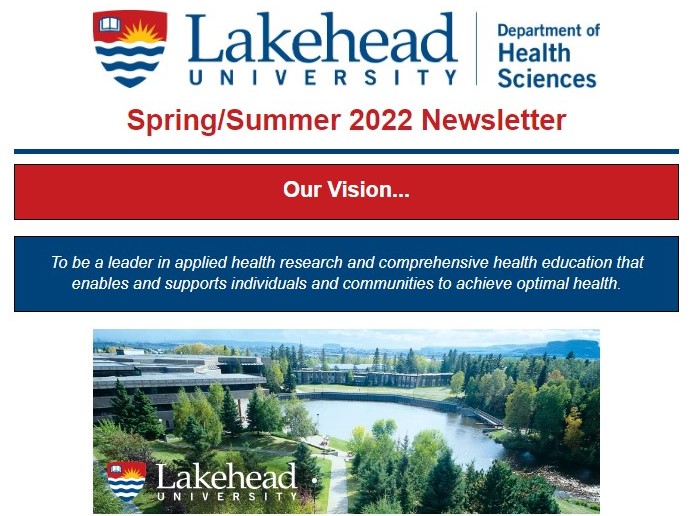June 23, 2022 – Thunder Bay, Ont.
Lakehead University researchers are receiving more than $2.4 million in funding from the Natural Sciences and Engineering Research Council of Canada.
Dr. Adam Algar, Associate Professor in Biology, is receiving a Discovery Grant for $235,000 to understand how species’ ecological limits are responding to rapid climate and land use change.

Dr. Algar will use lab experiments, field studies, remote sensing, and big data modelling to spend five years exploring what stops species from spreading outwards, to all environments.
Understanding what limits, or promotes, species’ geographical spread can have considerable conservation, economic, and health implications through effects on at-risk species, the spread of invasives, and even zoonotic disease risk.
“This research will shed new light on the mechanisms underlying species’ range limits and improve our ability to predict species’ geographical fates as rapid environmental change reshuffles global biodiversity,” Dr. Algar said.
Dr. Noah Phillips, Assistant Professor in Geology, is receiving a $142,500 Discovery Grant to study the strength of Earth’s plate-boundary-fault systems, where tectonic plates slide past one another. Fault systems host the world’s largest earthquakes and are zones of enhanced permeability and fluid flow through the Earth’s crust.

His group will spend the next five years trying to determine the strengths of strike slip fault systems in the middle to lower crust.
“This study will constrain the strengths of rocks deforming under elevated pressures and temperatures in the crust at 10 - 30 km depth,” Dr. Phillips said.
“These rocks slowly creep past one another at a relatively consistent rate to accommodate the motion of tectonic plates. Understanding their strengths is important as this slow creep loads the locked portion of tectonic plates at shallower depths which deform suddenly to produce earthquakes.”
Understanding how rocks and minerals deform is critical because it directly controls the evolution of planet Earth; and impacts society by producing earthquakes, modifying landscapes, and forming/trapping mineral and water resources.
Dr. Leila Pakzad, Associate Professor in Chemical Engineering, is receiving a $140,000 Discovery Grant to help address fundamental challenges related to medical inhaler device design.

Effective treatment of respiratory diseases depends on the properties of the aerosol/particles/droplets produced by the inhaler and the drug deposition efficiency in the lungs, which requires understanding drug particle aerodynamic behavior.
Despite advances in inhaler device technology, the efficiency of drugs using inhalers, known as drug deposition efficiency, is only 10 to 50 per cent.
Dr. Pakzad’s research in multiphase (solid/liquid/gas) flow focuses on interactions between solid particles, liquid droplets, and gas bubbles in drug inhalation systems.
“The short term objectives are to understand the mechanisms of multiphase flow during drug aerosol delivery by pressurized meterdose, dry powder, and soft mist inhalers; and to develop computational fluid dynamics models to simulate inhaler mouth throat pathways,” she said.
“The long term objective is to link drug deposition to inhaler design and operation and ultimately to drug deposition efficiency.”
Over the next five years, Dr. Pakzad’s research team will use experimental, numerical, and theoretical methods to address fundamental challenges related to inhaler device design. The team will assess the performance of inhalers, provide guidance to upgrade current designs, and facilitate the design of new devices.
This research will train highly qualified personnel in multiphase flow, drug delivery systems, and advanced computational techniques, supporting future economic development in Canada.
Dr. Andrew P. Dean, Lakehead’s Vice-President, Research and Innovation, congratulated each researcher receiving funding from NSERC and he thanked the agency for its continued support of STEM-based research at Lakehead University.
“Funding from the NSERC Discovery program is so important for our researchers and in particular our Early Career researchers,” Dr. Dean said.
“The list of successful researchers shows once again the incredible diversity of research in Science and Engineering at Lakehead University.”
In 2020/21, Lakehead University received nearly $2 million in assistance from the Research Support Fund to support the indirect costs of research, which includes costs for supporting the management of intellectual property, research and administration, ethics and regulatory compliance, research resources, and research facilities.
New NSERC Discovery Grant and Research Tools and Instruments Funding 2022
Total funding: $2,433,766
Discovery Grants (Five-year grants)
- Dr. Thangarajah Akilan, Department of Software Engineering, Towards More Efficient and Accurate Deep Learning Models for Segmentation, Classification, and Tracking, $137,500.*
- Dr. Adam Algar, Department of Biology, Scaling from Organismal Traits to Populations and Species Range Limits, $235,000.
- Dr. Muhammad Asaduzzaman, Department of Computer Science, Supporting Reusability of Online Code Examples, $137,500.*
- Dr. Amir Hossein Azimi, Department of Civil Engineering, Dynamics of Particles and Bubbles in Water and Viscoplastic Flow Mixtures, $130,000.
- Dr. Amanda Diochon, Department of Geology, The Effect of Disturbance on the Biogeochemical Cycling of Carbon in Northern Forest Soils, $125,000.
- Dr. Elshaer Ahmed, Department of Civil Engineering, Climate-resilient Modular Design for Indigenous Housing, $132,500.*
- Dr. Anas Issa, Department of Civil Engineering, Innovative Hybrid Bracing Systems for Enhancing Infrastructure Resilience, $132,500.*
- Dr. Robert Mawhinney, Department of Chemistry, Towards a Universal Molecular Moiety Feature Set from the Topology of the Electron Density, $120,000.
- Dr. Leila Pakzad, Department of Chemical Engineering, Experimental and Numerical Investigation of Multiphase (Solid-Liquid-Gas) Flow: Application to Respiratory Drug Delivery, $140,000.
- Dr. Noah Phillips, Department of Geology, The Strength of Strike-Slip Fault Systems: Constraints from the Rock Record, $142,500.*
- Dr. Amine Trabelsi, Department of Computer Science, Unsupervised Representation Learning and Abstractive Summarization of Stances in Social Media: Towards Explainable Detection Systems for Emerging Rumours, $137,500.*
- Dr. Nicholas Ravanelli, School of Kinesiology, Examining Biophysical and Physiological Factors Modulating Human Temperature Regulation, $157,500.*
- Dr. Francisco Ramos-Pallares, Department of Chemical Engineering, Investigating the Phase Equilibria of Branched Alcohol/Water/Salt Mixtures, $177,500.*
- Dr. Michael D. Rennie, Department of Biology, Connecting Individual Level Processes to Ecosystem Management and Restoration Efforts, $200,000.
*Including Discovery Launch Supplement.
Discovery Development Grants (Two-year grants)
- Dr. Ehsan Atoofian, Department of Electrical Engineering, Approximate Computing, $30,000.
Research Tools and Instruments (One-year grants)
- Dr. Pedram Fatehi, Canada Research Chair (Tier 2) and Industrial Research Chair in Green Chemicals and Processes, Department of Chemical Engineering, Director, Lakehead University’s Biorefining Research Institute (BRI), , A Dynamic Mechanical Analyzer for Assessing Thermomechanical Characteristics of Advanced Functional Materials, $148,766.
- Dr. Maryam Ebrahimi, Canada Research Chair in Low-Dimensional Nanomaterials (Tier 2), Department of Chemistry, Critical and urgent upgrade to ultrahigh vacuum chamber for growing 2D materials, $150,000.
– 30 –
Media: For more information or interviews, please contact Brandon Walker, Media, Communications and Marketing Associate, at (807) 343-8110 ext. 8372 or mediarelations@lakeheadu.ca.
Lakehead University is a fully comprehensive university with approximately 9,700 full-time equivalent students and over 2,000 faculty and staff at two campuses in Orillia and Thunder Bay, Ontario. Lakehead has nine faculties, including Business Administration, Education, Engineering, Graduate Studies, Health & Behavioural Sciences, Law, Natural Resources Management, Science & Environmental Studies, and Social Sciences & Humanities. Lakehead University’s achievements have been recognized nationally and internationally, including being ranked, once again, among Canada’s Top 10 primarily undergraduate universities in Maclean’s 2021 University Rankings; as well as included in the top half of Times Higher Education's 2022 World Universities Rankings for the third consecutive year, and the number one university in the world with fewer than 10,000 students in THE’s 2022 Impact Rankings (which assesses institutions against the United Nations’ 17 Sustainable Development Goals). Visit www.lakeheadu.ca.



 In a multi-site study funded by the Ontario COVID-19 Rapid Research Fund, scientists discovered a clue into the cause of post-acute COVID-19 syndrome (PACS), also known as long-COVID.
In a multi-site study funded by the Ontario COVID-19 Rapid Research Fund, scientists discovered a clue into the cause of post-acute COVID-19 syndrome (PACS), also known as long-COVID.




 Lakehead Engineering professor Salama Ikki has been selected for the prestigious Nokia Visiting Professorship offered by the Nokia Foundation.
Lakehead Engineering professor Salama Ikki has been selected for the prestigious Nokia Visiting Professorship offered by the Nokia Foundation.